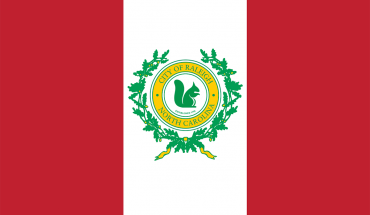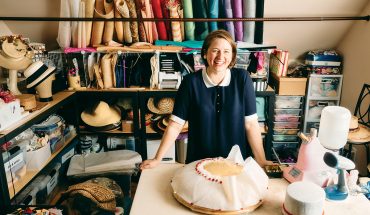A friendly face serves simple French fare at hidden gem Saint Jacques
by Catherine Currin
photography by Geoff Wood

“Bienvenue!” From the minute you step through the unassuming entrance to Saint Jacques French Cuisine, expect to be enveloped in the warm embrace of classic continental cuisine and service. Tucked into a modest shopping strip on Falls of Neuse Road, Saint Jacques opened in 2004 and has become a Francophile retreat. It’s old-school in all the best ways: crisp white tablecloths, simple dinnerware and bread served daintily from a basket by an outstanding server. There’s a small-yet-fantastic wine list, along with menu selections with a wide appeal—everything from a simple mixed green salad to sautéed frog legs. While the description may sound stuffy, there is an air of familiarity about the place, even if you pronounce your bonjour with a Southern accent.
That coziness is thanks, in large part, to Chef Serge Falcoz-Vigne. Originally from Grenoble, France, Falcoz-Vigne has lived in the United States for over a decade. He took over the kitchen as executive chef and general manager just three years ago, after working most recently as the executive chef at 18 Seaboard. Falcoz-Vigne says that experience of a restaurant is not just about the food: “It’s everything!” That’s why you’ll see him chatting with every patron as he brings out the amuse bouche (on my visit: a foie gras crème brûlée in a delicate tasting spoon) or helping his staff run food throughout the dinner service. He says that forging the connection between the kitchen and front of house makes for a better dining experience overall. “My desire is to please the customer,” says Falcoz-Vigne. “I want you to be happy when you come to Saint Jacques. We try to offer a representation of what a restaurant should be.”

Falcoz-Vigne has been surrounded by cooking his entire life. He cherishes early memories of cooking with his grandmother in France, where he trained as an apprentice for three years in local Grenoble restaurants before moving to Paris at age 18. “If you want to learn to cook, you can learn everywhere, in any kitchen—but if you want to be a chef, you have to go to Paris,” he says. There, he ran a restaurant called Au Passé Retrouvé in Paris’ 15th arrondissement with three friends for nearly two decades. He says he considers it a feat that his friends remained close during the time at the restaurant. “Owning a restaurant for 20 years is very difficult, and eventually, the friendships won.”

In 2007, Falcoz-Vigne moved with his wife and son to Raleigh, her hometown, and he’s been sharing his joy of cooking with the Triangle ever since. He says he loves the culinary community in North Carolina, and tries to make use of the local ingredients and makers whenever he can at the restaurant. “When I decided to move here, I thought ‘why not? I’m a chef, I like experience and a challenge.’” The experience has certainly paid off: On a Saturday evening, Falcoz-Vigne has a full house at Saint Jacques, and the crowd is diverse. There are young couples, families and old friends gathering for a meal. The entire experience is so intentional, sprinkled with miniscule details, it’s almost difficult to comprehend that the whole thing is happening just feet away from a Harris Teeter and Chipotle. “We do classic French food. That is why people come to us.”
While Saint Jacques is arguably a fine dining experience, Falcoz-Vigne says simplicity is the secret. “French cooking is more a spirit than a technique,” he says. “The cuisine is very simple, but the ingredients matter just as much.” Falcoz-Vigne credits American chef Julia Child for paving the way for future French chefs in America. “There is sometimes a connotation of French food that it’s too fancy,” he says. “Julia Child did a very good thing—she imported products to the U.S. and found dishes from France that Americans would like. She changed the mentality of American cooking.”

Falcoz-Vigne closely follows the techniques he learned in Paris, and he also infuses North Carolina into his dishes whenever he can. “If I can substitute with any local product I will do that.” He uses beef from Firsthand Foods in Durham, and cheese plates consists of two French cheeses, plus one that’s locally made, like from nearby Boxcarr or Prodigal Farm. Falcoz-Vigne says that respecting ingredients is crucial in French cooking. “If you mistreat your product, it usually doesn’t turn out well.” It’s obvious that each ingredient is handled with care at Saint Jacques, from the escargot drenched in Maître d’Hôtel butter to the crispy lardons that accompany the steamed mussels. Falcoz-Vigne says that some of his dishes come from memories, like the Ravioles du Royan au Saumon Fumé, raviolis topped with smoked salmon and cream sauce. “People don’t order it as much because it seems unusual, but it’s one of my favorites, so I keep it on the menu.”
Falcoz-Vigne says that a French menu can seem very exotic and intimidating, but Saint Jacques strives to avoid that reputation. “I try to make accessible food, and I want to offer what is the best of French classic food. We share a lot of love around food. All of these great moments in the family happen around the table. When you see something turned into a delicious meal, it’s like magic.” He hopes he and his team ensure guests feel comfortable and return for more. “Food brings joy. Every day. If we enjoy food, we are happy every day.”



